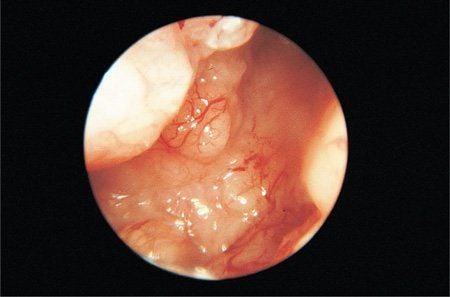This is an automatically translated article.
The article was consulted with Specialist Doctor I To Kim Sang - Internal Oncologist - Oncology Center - Vinmec Central Park International General Hospital.Endometrial cancer is on the rise and is becoming the most common gynecological cancer among women. Therefore, women need to know the symptoms and causes of the disease in order to promptly screen and treat early.
1. What is endometrial cancer?
Endometrial cancer (also known as Uterine Cancer or Endometrial Carcinoma) is the most common gynecological cancer among cancers in women. The disease can occur at any age, but is more common between the ages of 45-75. The average age of endometrial cancer patients at diagnosis is 60, however, the disease is tending to be younger. Endometrial cancer is more common in people who are overweight, obese, have diabetes, use products containing the hormone estrogen, have a family history of colon or ovarian cancer. ovarian or endometrial cancer, late menopause, early menarche before age 12, previous treatment for breast cancer, ovarian cancer, pelvic radiation therapy, polycystic ovary syndrome or endometrial hyperplasia atypical.2. Some pictures of endometrial cancer

Hình ảnh ung thư lớp nội mạc ở đoạn cổ tử cung

Hình ảnh ung thư nội mạc tử cung đoạn gần ống dẫn trứng

Hình ảnh carcinom nội mạc tử cung

Hình ảnh các tế bào ung thư nội mạc tử cung trên mẫu sinh thiết dưới kính hiển vi
3. Symptoms of endometrial cancer
3.1. Abnormal vaginal bleeding
This is one of the common signs of endometrial cancer. Vaginal bleeding is common in post-menopausal women. However, most women also need to be alert if they encounter unusual symptoms such as heavy menstrual bleeding, longer menstrual periods, or bleeding between periods, because those may be symptoms. symptoms of endometrial cancer.3.2. Unusual discharge of discharge
Vaginal discharge is normal for women, but if the amount of discharge is large, has an abnormal color, especially after menopause, this is most likely a sign of cancer in the endometrial layer. bow .3.3. Frequent pelvic pain
Pelvic pain is a very common symptom in patients with endometrial cancer. As the cancer cells grow, the tumor becomes larger, the patient often has pelvic pain, an abnormal mass in the lower abdomen or pain during sex.3.4. Change in bowel and bladder habits
The presence of a tumor in the lining of the uterus can cause pressure on the bladder, causing the patient to have problems urinating. At this time, the pressure on the pelvis causes the patient to urinate more often and have pain or difficulty in the process of urinating. In many cases, patients have painful urination, urinary retention, blood in the urine or in the stool.3.5. Losing weight for no reason
Unusual weight loss is a common symptom for people with endometrial cancer. Patients with severe weight loss over time, accompanied by other gynecological symptoms, adversely affect health.When you suspect that you have endometrial cancer symptoms mentioned above, you need to take the initiative to go to the doctor and frankly discuss with your gynecologist to get an accurate diagnosis of the disease. Depending on your age, health situation and severity of the disease, the doctor will advise an appropriate treatment method.
4. Causes of endometrial cancer

Đa phần chị em đều tỏ ra chủ quan đối với các nguyên nhân gây ra ung thư nội mạc tử cung
4.1. Hormonal imbalance
A hormonal imbalance can cause excess body fat to be stored, leading to an increase in estrogen levels. This is one of the causes of endometrial cancer that women should not subjectively ignore.4.2. Irregular menstruation
Irregular menstruation is also one of the causes of endometrial cancer. In addition, women who have their first period too early or too late are also more susceptible.4.3. Unhealthy diet
People who have a preference for eating a lot of fat and fat have a higher risk of endometrial cancer than those who eat a healthy diet, focusing on adding more vegetables and fruits in their daily meals. The reason is, bad fat can cause the accumulation of estrogen hormone leading to endometrial proliferation, which in turn causes cancer.4.4. Have diabetes, high blood pressure
Diabetes, high blood pressure often affect the functioning of the pituitary gland, increasing estrogen levels, leading to an increased risk of polycystic ovary syndrome, endometrial hyperplasia,... And that cause endometrial cancer.4.5. Due to genetic factors
If someone in your family has had uterine cancer, there is a good chance that you too. Therefore, in this case, do a health check and endometrial cancer screening early to detect and treat the disease in time, maximizing the chances of survival.5. How long does endometrial cancer live?
For most women with the disease, the question "how long does endometrial cancer live" is always something that makes them wonder and worry. If at the time of diagnosis, the cancer cells in the endometrium have not spread, there is a 95% chance of survival after 5 years. However, if these cancer cells have spread to other organs, this number is only about 25%, which means that the patient's prognosis becomes worse.
Bệnh nhân ung thư nội mạc tử cung sống được bao lâu?
6. Screening for endometrial cancer
Currently, there are no effective means to screen for endometrial cancer. The best way to detect endometrial cancer early is to visit a gynecologist as soon as any of the above abnormal symptoms (such as bleeding or abnormal vaginal discharge...) .Here are the common methods to help detect the disease:
6.1. Clinical examination and cancer screening consultation
The American Cancer Society recommends that women with high risk factors for endometrial cancer be examined and consulted with their doctor about endometrial cancer risk assessment, physical examination, and more. Vaginal-rectal, as well as advice on common symptoms of endometrial cancer.In addition, women with a family history of colon cancer, endometrial cancer, Lynch syndrome should be counseled about genetic testing to assess the risk of endometrial cancer. .
6.2. Pap smear (cervical smear)
This is a fairly simple test, performed by separating shed cells from the cervical lining, staining and then looking under a microscope to look for abnormal cells, dysplasia, and abnormal cells. precancerous and cancerous,... When the Pap Smear result is abnormal, the patient may have inflammation or cancer in the cervix, uterus; Then the doctor will perform tests to help confirm the diagnosis by colposcopy or endometrial biopsy in certain situations. However, the Pap test mainly helps in early detection of cervical cancer rather than endometrial cancer.6.3. Hysteroscopy
Hysteroscopy is a measure used for early detection of endometrial cancer, which is indicated by doctors when detecting abnormal uterine lesions or with subjects over 40 years of age at high risk. . This method uses an endoscope with a magnification of up to 10-30 times, can be connected to a computer screen to display images, save and print out for subclinical evidence, convenient to follow later. .6.4. Endometrial biopsy
Biopsy is a method of screening for endometrial cancer with fairly accurate results. It is carried out by separating the tissue suspected of having lesions at the hysteroscopy site, then looking through it under the microscope to find the malignant cells. The American Cancer Society recommends that high-risk women such as Lynch syndrome (familial non-polyposis colon cancer) be evaluated for endometrial cancer each year by endometrial biopsy. uterus starting at the age of 35.6.4. ThinPrep Pap Test
ThinPrep Pap is essentially an improved Pap smear. If the Pap Smear test previously only achieved about 70% sensitivity and specificity, with the ThinPrep Pap test, this number can be up to 100%. With this screening method, the histopathology obtained from the cervix is not smeared onto a slide for microscopy like a conventional smear, but is washed completely with a vial liquid. ThinPrep and then shipped to the lab for processing with the ThinPrep machine. At this point, the template is completed automatically. Similar to the Pap test, the ThinPrep Pap test is mainly used to detect cervical cancer, but it can also detect endometrial cancer in some cases; however, neither the Pap test nor the ThinPrep Pap test are good tests for detecting endometrial cancer.ThinPrep Pap Test has been applied by Vinmec International General Hospital to the screening test and early detection of gynecological diseases. ThinPrep Pap Test has changed the traditional Pap smear method, through membrane controlled cell transfer technology, increasing the sensitivity and specificity in detecting precancerous cells. , especially glandular epithelial cells, a type of cancer cell that is difficult to detect.

ThinPrep Pap Test - Phương pháp mới xét nghiệm sớm ung thư cổ tử cung
If you need more advice and examination at Vinmec Health System Hospitals nationwide, please book an appointment on the website for service.
Please dial HOTLINE for more information or register for an appointment HERE. Download MyVinmec app to make appointments faster and to manage your bookings easily.













